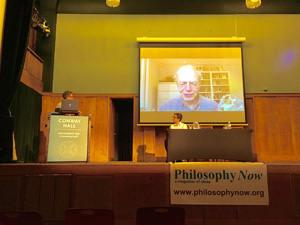
Your complimentary articles
You’ve read one of your four complimentary articles for this month.
You can read four articles free per month. To have complete access to the thousands of philosophy articles on this site, please
News
News: December 2016 / January 2017
Peter Singer wins Philosophy Now Award • Philosophers and the US Election • Animal Welfare: Good News & Bad News? — News reports by Anja Steinbauer
Animal Welfare Ups and Downs I
This first of two reports on morally ambiguous animal welfare developments concerns male chicks, who owe their short existences to the breeding industry for egg-laying hens. Since they don’t have sufficient body mass to justify raising them commercially for meat, millions of male chicks are killed every year. This is done by gassing, suffocation in plastic bags, or maceration, i.e. being mechanically ground up, none of which are likely to be painless. TeraEgg is a new technology which can examine eggs and sex the foetus through a non-invasive process known as terahertz spectroscopy. This will mean that the eggs containing male fetuses can be destroyed weeks before hatching occurs. While this seems a step in the right direction in that it does reduce animal suffering, animal welfare supporters have argued that it is a figleaf masking the bitter reality of continued animal exploitation.
Animal Welfare Ups and Downs II
Our second piece of contentious animal welfare news takes us into the world of animal use for human medical research and training purposes. Washington University’s medical school has announced that it will cease to use cats in medical training after finding that technological advances in simulators and mannequins mean that they can now adequately replace live animals. The anatomy of a cat’s windpipe closely resembles that of a newborn infant, so cats provided the best training ground for medical students. Animal welfare activists had put serious pressure on medical schools to stop using live animals, causing some schools to change to technological replicas before experts deemed them to be viable alternatives, or to even be secretive about their continued use of live animals. There is now a new call for general ethics guidelines on the use of animals in medical contexts.
Philosophers and the US Election
Philosophers rarely take the plunge into the mud bath of real-life moral and political problems, but many did comment on the recent US presidential election, including Brian Leiter, well known for his widely-read Leiter Reports blog about academic philosophy. The great majority of philosophers quoted online opposed the election of Donald Trump. Prof. Harry Frankfurt, for instance, called Trump a master of ‘bullshit’, a form of dishonesty distinct from lying and characterised by the speaker’s utter indifference to whether what they say is true or not. No, Trump is a pragmatist in the tradition of C.S. Peirce, said Oxford moral philosopher Daniel Robinson to Quartz magazine. A tiny handful of other philosophers also backed Trump. In an interview posted on his website, the post-Marxist provocateur Slavoj Žižek shocked many (maybe that was the point?) by declaring that he would have voted for Trump despite being “horrified at him.” Žižek said: “Listen, America is still not a dictatorial state; he will not introduce fascism. But it will be a kind of big awakening. New political processes will be set in motion.”
Free Discussion vs ‘Safe Spaces’?
Surely universities are bastions of free speech, where proponents of opposing opinions on moral, political, philosophical and social matters can test out the viability of their views in fierce but reasoned verbal battle? Increasingly, student unions in the UK and US declare ‘safe spaces’ and demand that controversial speakers be ‘no platformed’. The idea is that the expression of certain views might make members of one or other minority group feel unsafe and should therefore be prevented. This happened to Iranian secularist and feminist Maryam Namazie, a well-known intellectual and critic of the position of women in Islam; her 2015 lecture at Goldsmiths University was aggressively disrupted with repeated references to ‘safe spaces’. Most recently, when one of Britain’s best-known philosophers, Sir Roger Scruton was invited to Bristol University the student union tried to no-platform him due to the fact that although he defends gay relationships on the grounds of personal choice, he opposes gay marriage.
Philosophy Now Award 2016 Won by Peter Singer

Peter Singer receives the award
The 2016 Philosophy Now Award for Contributions in the Fight Against Stupidity has been given to Australian moral philosopher Peter Singer.
Singer was nominated not for his work in general but for two very specific reasons. Firstly, for embodying the idea of a practical philosopher who doesn’t only analyze ethical problems but who also strives to apply a reasoned ethical stance to the difficult decisions that face us all in our everyday lives. Secondly, in trying to prove that we have duties to help strangers, his books and arguments have set out to disturb the comfortable complacency with which many of us habitually ignore the desperate needs of others, and that certainly counts as fighting stupidity. The Award is particularly for this work as it relates to the Effective Altruism movement, an attempt to use research and comparative analysis to organize the charitable efforts of people in the directions in which it will do the most good.
The (transatlantic) award ceremony was held at London’s Conway Hall on 31 October. After a brief acceptance speech via video by Peter Singer, Samuel Hilton spoke to the audience about the Effective Altruism movement inspired by Singer’s work. The 2014 Award was given to Noam Chomsky and last year’s award went to children’s author Cressida Cowell.









